
FOI 24/25-0223
Document 11
Research – Massage Therapy as an Intervention for Multiple
Sclerosis
Confirm if any updated research has been published since last TAB advice,
regarding the use of massage therapy as an effective intervention for
maintenance of function.
AAT request for advice regarding remedial massage therapy as reasonable and
necessary support for a participant with Multiple Sclerosis, to improve mobility
Brief
and/or maintain current function.
Population – Applicant with MS
Intervention – remedial massage therapy
Comparison – no
Specific outcome measure - no
Date
03/05/2021
Requester(s)
Michelle Ms47F - personal privacy
Researcher
Jane Ss47F - personal privacy
Cleared
N/A
Please note:
The research and literature reviews col ated by our TAB Research Team are not to be shared external to the Branch. These
are for internal TAB use only and are intended to assist our advisors with their reasonable and necessary decision-making.
Delegates have access to a wide variety of comprehensive guidance material. If Delegates require further information on
access or planning matters they are to call the TAPS line for advice.
The Research Team are unable to ensure that the information listed below provides an accurate & up-to-date snapshot of
these matters.
1 Contents
2 Summary ......................................................................................................................................... 2
3 Cochrane Review of Non-Pharmacological Therapies .................................................................... 2
4 Literature Review ............................................................................................................................ 3
5 References ...................................................................................................................................... 9
Research – Massage Therapy as an Intervention for Multiple Sclerosis
Page
1 of
9
Page 1 of 9

FOI 24/25-0223
Document 11
2 Summary
• Approximately one third of individuals with multiple sclerosis (MS) report they use massage
therapy (MT) as an adjunct to their medical treatment, often because conventional
treatments are not effective in managing their symptoms [1, 2].
• There is little experimental evidence supporting MT in improving symptoms or functional
capacity [2, 3].
o Studies investigating quality of life (QoL), self-reported health status, spasticity,
fatigue, balance, mood/anxiety and walking speed often report differing results (see
Table 1 for individual results).
o Sample sizes are small and the methodological quality of the studies are often of
low.
3 Cochrane Review of Non-Pharmacological Therapies
The Cochrane Col aboration has investigated the effectiveness and safety of non-pharmacological
therapies for the management of chronic pain in people with MS [4]. Despite a comprehensive
search of the literature, only 10 trials evaluating non-pharmacological treatments fulfilled the
inclusion criteria:
• Transcutaneous electrical nerve stimulation (TENS)
• Psychotherapy (telephone self-management, hypnosis and electroencephalogram (EEG)
biofeedback)
• Transcranial random noise stimulation (tRNS)
• Transcranial direct stimulation (tDCS)
• Hydrotherapy (Ai Chi)
• Reflexology.
Due to the quality of the published studies, many aspects of non-pharmacological interventions for
MS pain remain unproven.
Other non-pharmacological interventions such as yoga, massage therapy and radial shock wave
therapy were not included in the review as no published studies fulfilled the inclusion criteria. This
criteria included randomised controlled trials (RCTs), cross-over studies that compared non-
pharmacological therapies with a control intervention for managing chronic pain or clinical
control ed trials (CCTs).
Research – Massage Therapy as an Intervention for Multiple Sclerosis Page
2 of
9
Page 2 of 9
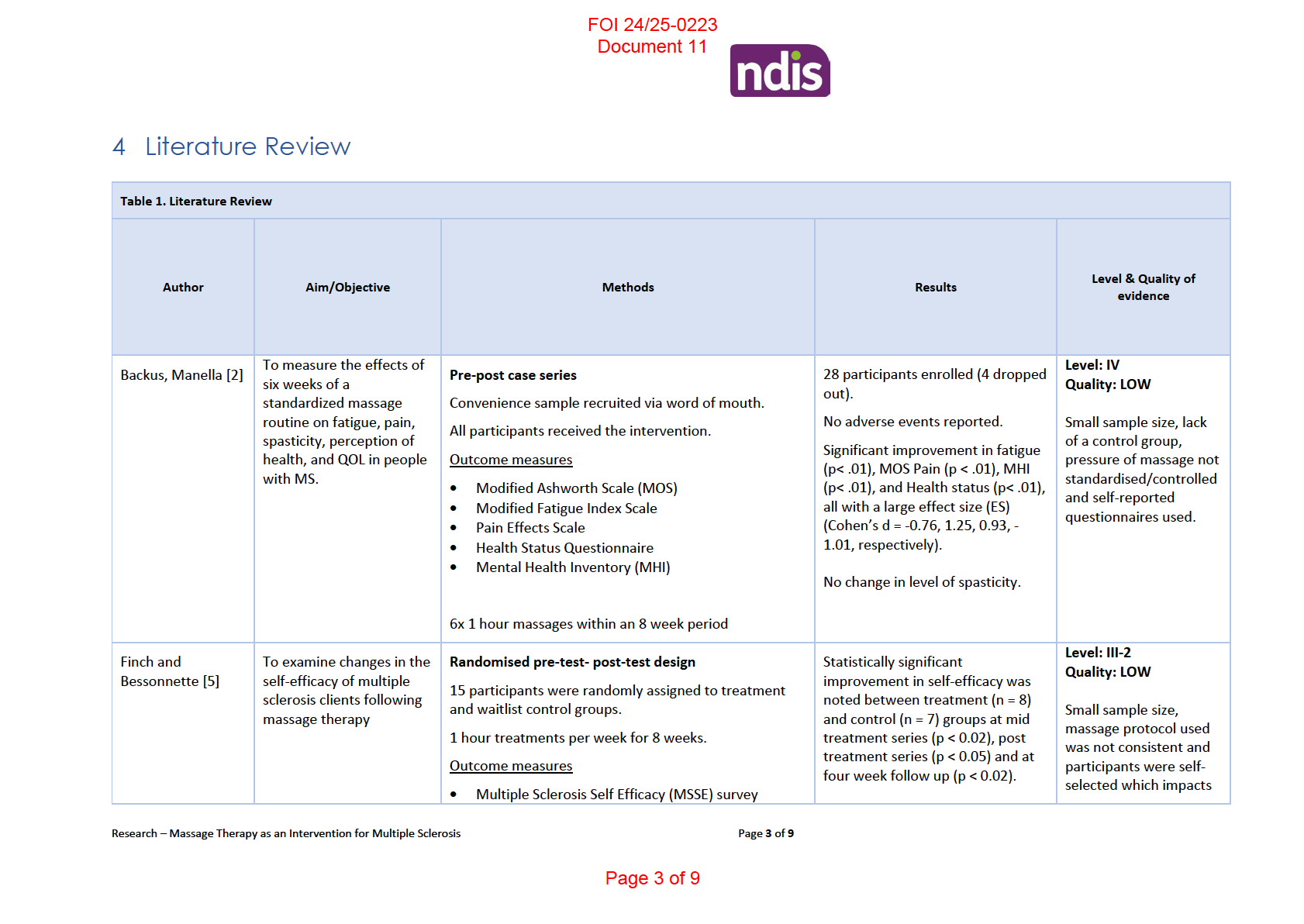
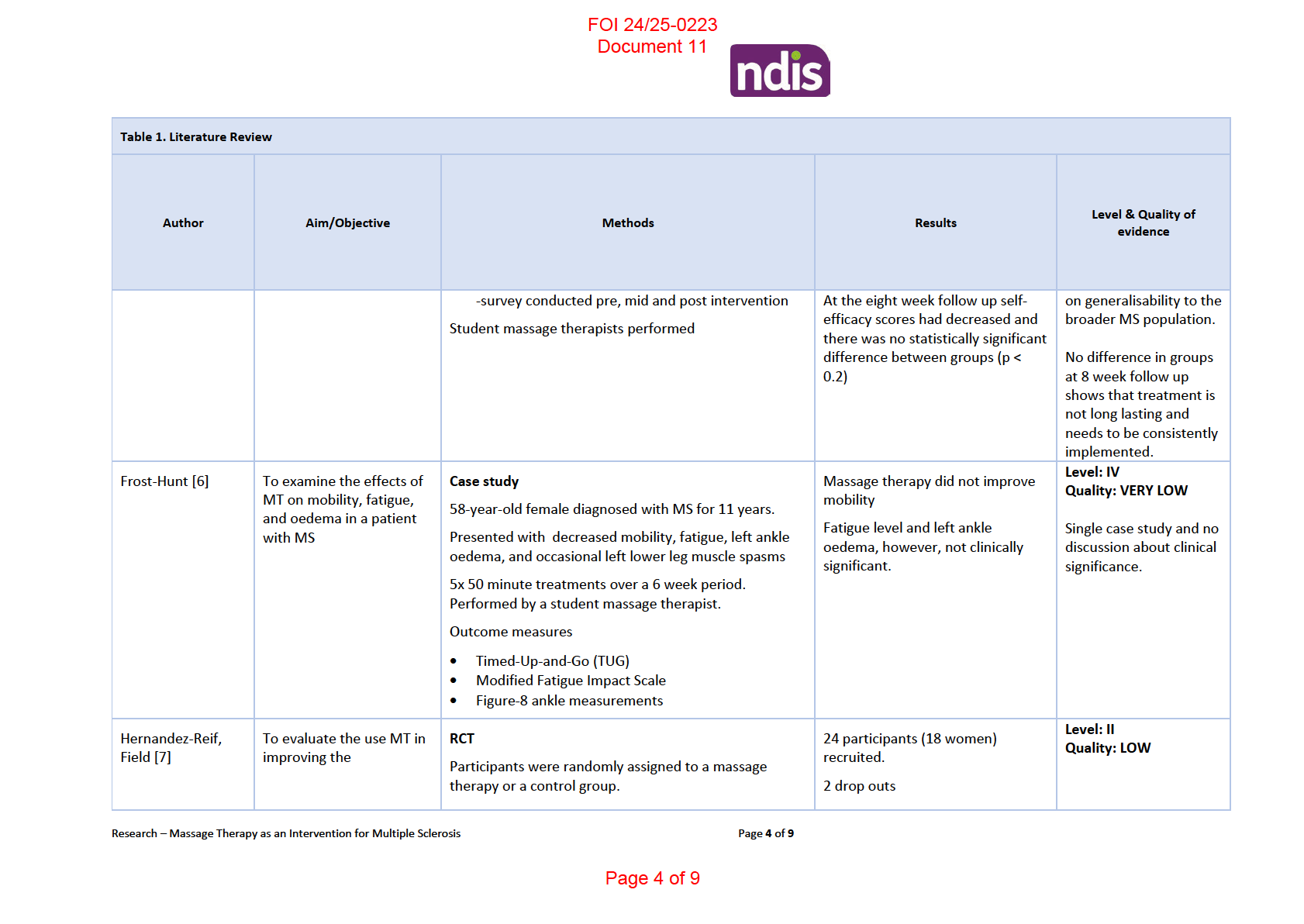
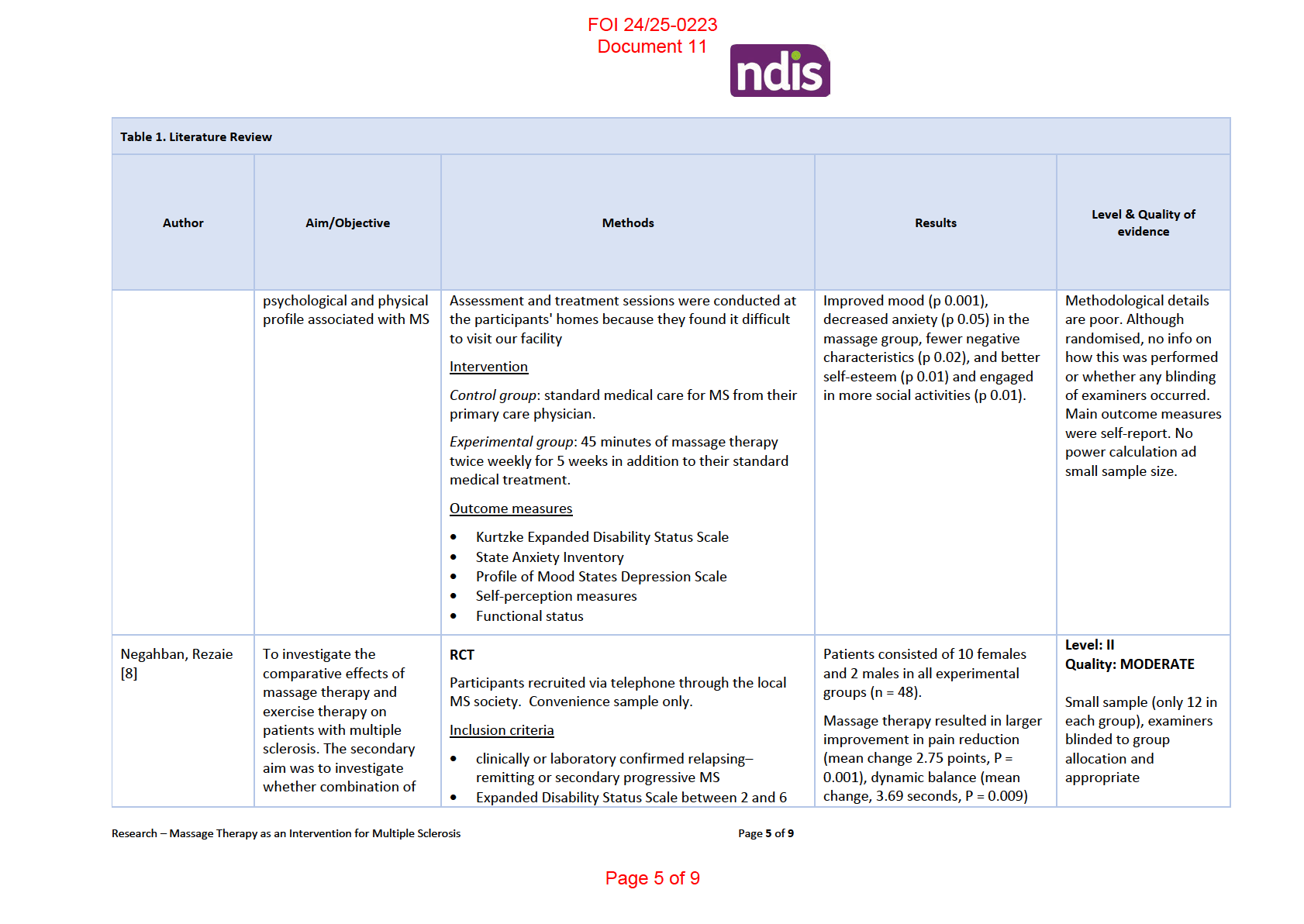
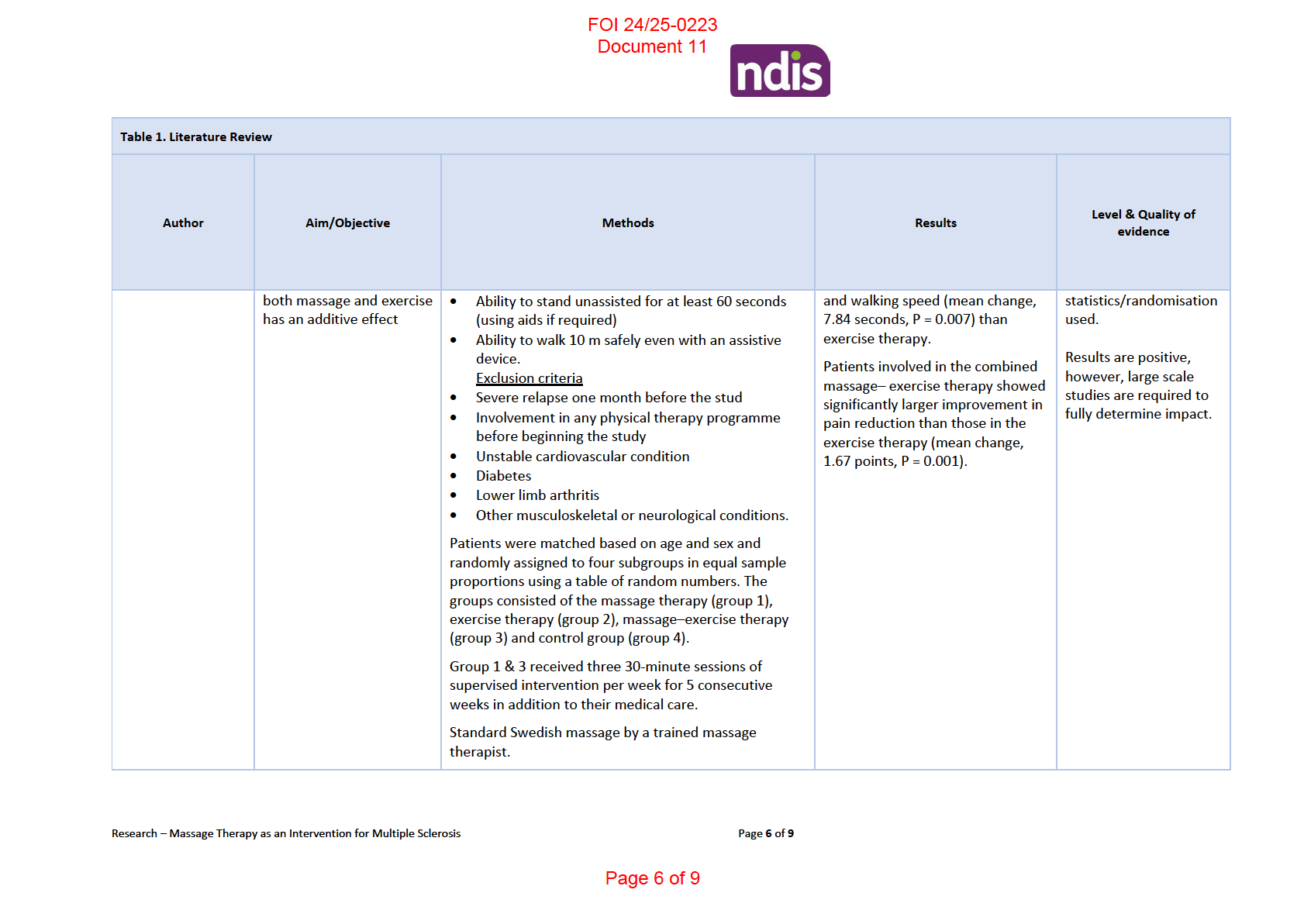
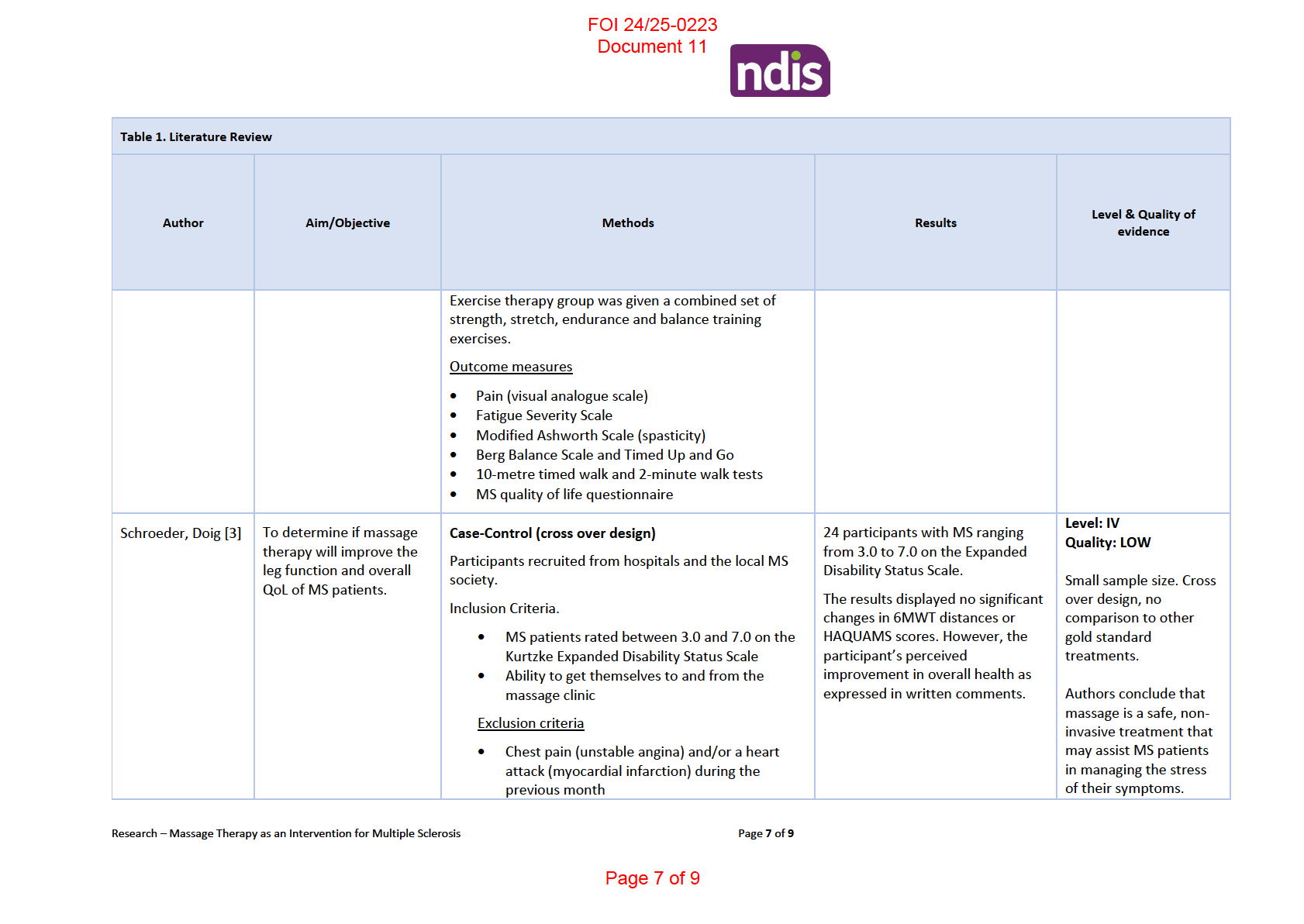
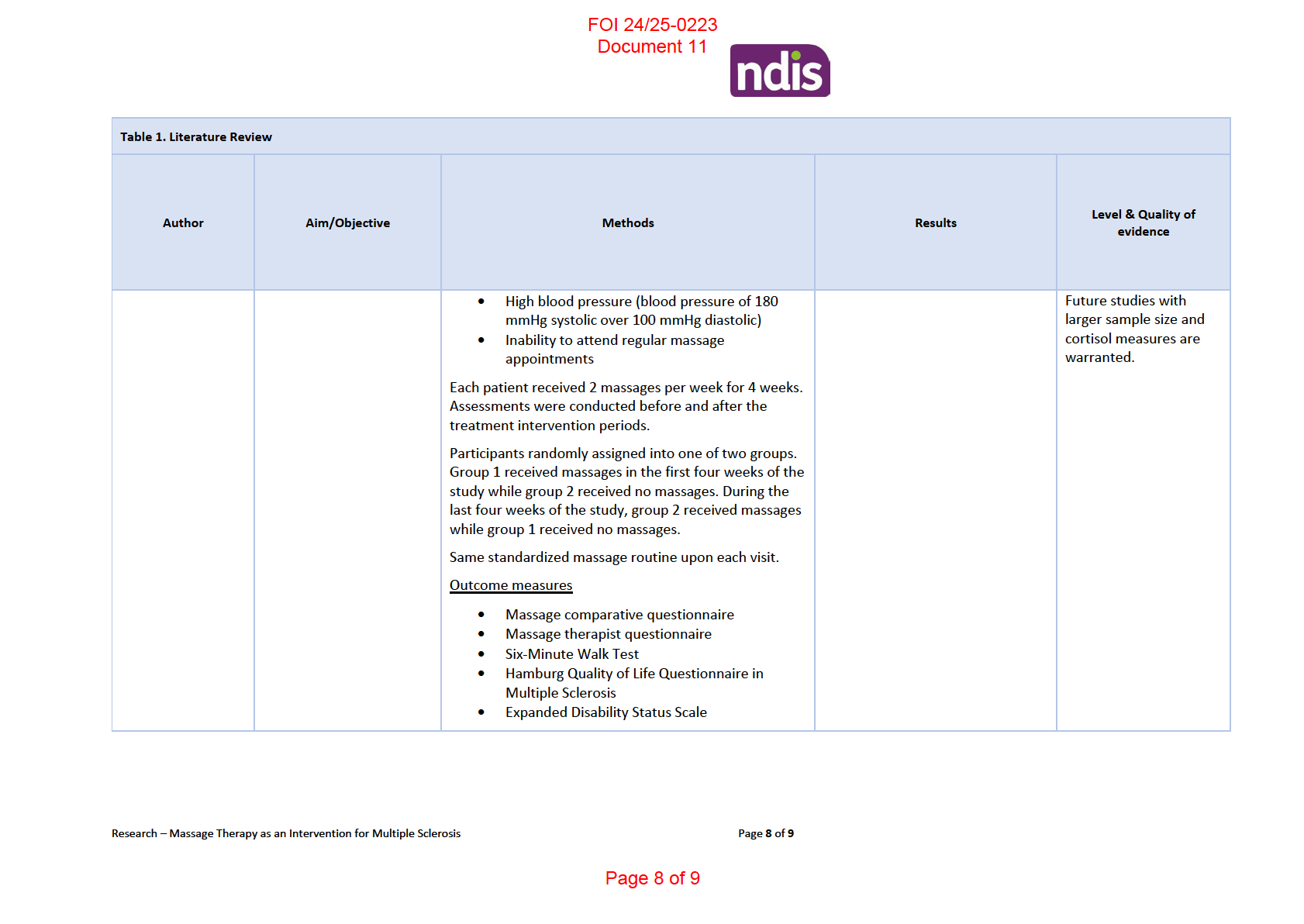

FOI 24/25-0223
Document 11
5 References
1.
Silbermann E, Senders A, Wooliscroft L, Rice J, Cameron M, Waslo C, et al. Cross-sectional
survey of complementary and alternative medicine used in Oregon and Southwest Washington to
treat multiple sclerosis: A 17-Year update. Multiple sclerosis and related disorders. 2020;41:102041.
2.
Backus D, Manel a C, Bender A, Sweatman M. Impact of Massage Therapy on Fatigue, Pain,
and Spasticity in People with Multiple Sclerosis: a Pilot Study. International journal of therapeutic
massage & bodywork. 2016;9(4):4-13.
3.
Schroeder B, Doig J, Premkumar K. The effects of massage therapy on multiple sclerosis
patients' quality of life and leg function. Evidence-based complementary and alternative medicine :
eCAM. 2014;2014:640916.
4.
Amatya B, Young J, Khan F. Non-pharmacological interventions for chronic pain in multiple
sclerosis. The Cochrane database of systematic reviews. 2018;12:CD012622.
5.
Finch P, Bessonnette S. A pragmatic investigation into the effects of massage therapy on the
self efficacy of multiple sclerosis clients. Journal of bodywork and movement therapies.
2014;18(1):11-6.
6.
Frost-Hunt A. Effects of Massage Therapy on Multiple Sclerosis: a Case Report. International
journal of therapeutic massage & bodywork. 2020;13(4):35-41.
7.
Hernandez-Reif M, Field T, Field T, Theakston H. Multiple sclerosis patients benefit from
massage therapy. Journal of Bodywork and Movement Therapies. 1998;2(3):168-74.
8.
Negahban H, Rezaie S, Goharpey S. Massage therapy and exercise therapy in patients with
multiple sclerosis: a randomized controlled pilot study. Clinical rehabilitation. 2013;27(12):1126-36.
Research – Massage Therapy as an Intervention for Multiple Sclerosis
Page
9 of
9
Page 9 of 9








